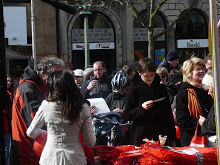
Last Saturday, we attended the Győr Media Ball here. It was at the local university sportsplex, but completely revamped so that it looked like a very large (almost vacuous) ballroom with massive screens, scrims, all types of lighting, and TV screens. It is supposed to be the biggest, fanciest ball in Hungary (so I was told by some, but not the people there.) We were invited by our generous neighbors, Vera and Lászlo, along with his brother and his brother's wife. We sat at round tables with about 10 people each. We were greeted with a glass of sparkling wine, and later served two dishes, but served ourselves at various buffet tables set up around the large space. The Philharmonic, the local Ballet, a "fashion" show (which was, in my opinion, just an excuse to show skin of young women while were acting frivolously competitive with eachother). However, the tall head-dresses were very interesting.
There were TV and media personalities, famous Hungarian musicians, chanteuses, and comedians. It is very exciting to see into a culture as specific as the Hungarian culture and legacy. It's been repressed under different authorities for centuries, and they are very proud to be surviving with their certain Hungarian aesthetic and traditions intact. Their feelings as a nation, I believe, are epitomized by this quote I read during a research session at the Open Society Archives in Budapest. It was quoted by an Eastern German citizen who had written a letter to the West German Radio Free Europe (Berlin, 1962) with the exact same sentiment:
Lajos Koschuth (this writer spelled this family name the German way. It should be Kossuth), a Hungarian freedom fighter from 1848 wrote:
"We have fought, but we were not victorious,
We have struggled and yet we lost,
But when history will write about us
It can be said that we have resisted."
I don't know if, on a night like this one, many of the people would want to hear these words. It's difficult to tell when and if different generations want to feel pride. Because of this supposed "globalized" society, so often it seems that the younger generations do not want to feel a pride in their country's uniqueness. They seem to embrace the global culture (as many argue with much proof) which is dominated by American advertising and product placement. Hungary, on a night like this seems so unique to me. When "Charlie" the famous Hungarian Blues singer croons about lost love and uncertainty of life in his native language, everyone young and old knows the words and get crazy with their enthusiasm, grown men jumping up and down, hugging and kissing other men and women, girls screaming. I was told he had just been in New York City for some performances.



